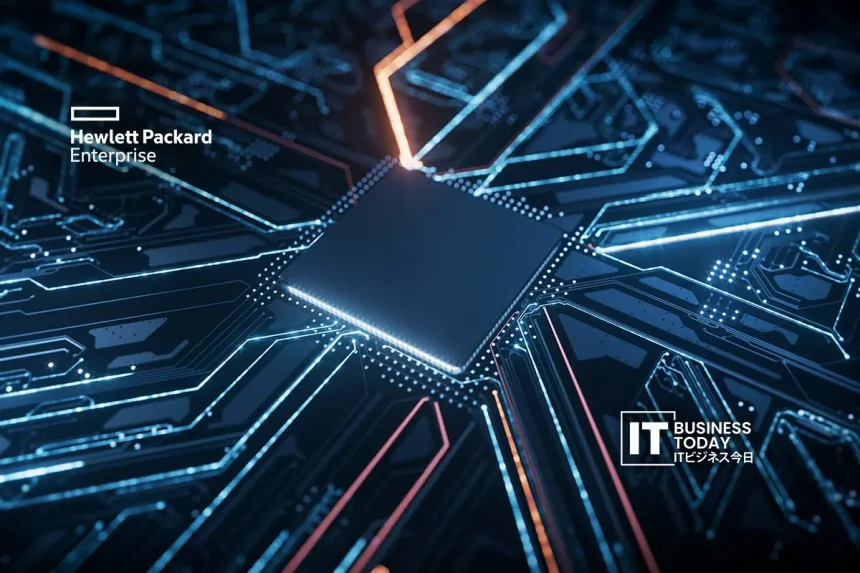日本ヒューレット・パッカードは、統合ハイブリッドクラウドプラットフォーム戦略について説明。HPE執行役員 プリセールス本部長の中村文彦氏は、「エージェントベースのAIOpsをほぼすべてのインフラレイヤーに統合することで、HPEはGreenLake CloudをエージェントベースのAIを活用したハイブリッドクラウドに変えることができます。今後は、インフラ、データプラットフォーム、ランタイムソフトウェア、運用など、GreenLakeの各レイヤーにエージェントベースAIを実装していきます。“
統合ハイブリッドクラウドプラットフォーム戦略HPE合同会社は29日、統合ハイブリッドクラウドプラットフォーム戦略について説明しました。HPE執行役員プリセールス本部長の中村文彦氏は、「エージェントベースのAIOpsをほぼすべてのインフラレイヤーに統合することで、HPEはGreenLakeクラウドをエージェントベースのAIを活用したハイブリッドクラウドに変革することができます。今後は、インフラ、データプラットフォーム、ランタイムソフトウェア、運用など、GreenLakeの各レイヤーにエージェントベースのAIを実装していきます。“
このフレームワークは “HPE GreenLake Intelligence ”と呼ばれています。日本ヒューレット・パッカードの中村執行役員は、“GreenLake IntelligenceはエージェントベースのAIOpsを用いてハイブリッドクラウドの運用を変革する ”と述べています。彼は “GreenLakeが車だとすれば、GreenLake Intelligenceは最先端の自律走行機能を備えた車のようなもの ”という比喩を用いました。インフラストラクチャー、オペレーション、FinOpsなど様々なレイヤーのAIエージェントは、企業が運用ポリシーやサービスレベルを達成するためのアシスタントとして機能します。エージェントは洞察を提供し、問題を迅速に解決します。“インフラストラクチャのプロビジョニングの際、エージェントは互いに協議し、パフォーマンス、コスト、その他の要素に基づく構成案を提示します。管理者は最適な提案を選択し、利用を開始することができます。運用時には、パフォーマンス上の問題を検知・診断し、解決策を提示します。これにより、生産性の向上、リスクの低減、修理の迅速化、日常業務や運用ライフサイクル全体を通しての障害の最小化が実現します。また、「MCPを使用することで、GreenLake Intelligenceが提供する特殊な推論エージェントと連携することができます。.
こちらもお読みください: 理化学研究所、富嶽NEXTシステムで富士通・NVIDIAと提携
将来的には、サーバー、ストレージ、ネットワーク、OS、観測可能性、FinOpsなどのエージェントをリリースする予定です。これらのエージェントが連携することで、フルスタック環境で成果を上げることができます。”また、GreenLakeポータルにGreenLake Copilotを実装することで、ユーザは複雑化するハイブリッドクラウド環境を自然言語で管理・運用できるようになると述べました。GreenLake Intelligenceの最初の実装はHPE Aruba Networking Centralに予定されており、約600万台のネットワークデバイスと30億以上のクライアントエンドポイントから収集したデータを分析します。HPEのAgent Meshが提供する豊富なコンテキストを活用して自律的な推論を行い、正確な原因特定と修復を可能にします。「最初の製品は、HPE Aruba Networking Central向けのGreenLake Intelligenceです。リアルタイムとナレッジベースに分類される15以上の特化型AIエージェントが連携し、システムを継続的に最適化して管理者に通知します。2025年第3四半期からの提供開始を予定しています。“2つ目の「HPE CloudOps Software」は、既存のハイブリッドクラウド運用を強化する新しいソフトウェアスイート。統合マルチクラウド管理を提供する「HPE Morpheus」、フルスタックのマルチベンダーAIOpsを実現する「HPE OpsRamp」、エッジからクラウドまでデータを保護し、ランサムウェアをリアルタイムに検知する「HPE Zerto」で構成。”これまで個別に提供していたこれらの製品を組み合わせることで、ハイブリッドクラウド環境における運用強化のメリットを享受できます。各製品はHPEが買収した企業の製品ですが、マルチベンダー、マルチクラウドという共通要素があり、併用が可能です。これにより、ソリューションによる柔軟性が向上し、価値創造が加速します。“さらにHPEは、HPE Morpheus VM EssentialsとHPE Private Cloudの統合を発表。また、CX10000によるマイクロセグメンテーションの実装や、Veeam、Commvault、Cohesityとの統合も発表。「また、既存の仮想化環境を最新化し、移行するためのサービスも開始します。VM Essentialsは現在、Dell PowerEdgeやNetApp AFFなどのサードパーティ製品を含む、新しいハードウェアをサポートしています。今後もプラットフォームのアップグレードを続けていきます」。3つ目の「AIファクトリー・ソリューション」は、AIワークロードの増加に対応するソリューションとして位置づけられています。「このソリューションでは、全社的、部門横断的にAIをどのように考え、運用していくかに取り組みます。パイロット段階から利益創出、成果までをカバーし、AIの導入と活用を成功に導き、究極のハイブリッドワークロード運用を可能にします。”
NVIDIAと共同開発したHPE Private Cloud AIは、企業向けのTurnkey AIファクトリー、サービスプロバイダーやモデル開発者を対象とした大規模AI導入向けのAIファクトリー・アット・スケール、政府・公的機関、金融、製薬などの機密性の高いデータを扱うためのSovereign AIファクトリーを提供。また、HPE CloudOps Softwareをポートフォリオ全体で共通のコントロールプレーンとして使用できることも実証。また、HPE OpsRampがNVIDIA Enterprise AI Factoryの観測ソリューションとして認定されたことも発表。「HPEのコンポーネントだけでなく、マルチベンダー環境でフルスタックの観測性を提供できる」と同社。さらに、次世代HPE Private Cloud AIの一部として、インターネットに接続されないエアギャップ構成で機密データを保護。また、マルチテナントにより、企業内のグループコラボレーション、GPUクォータ管理、ロールベースのアクセス制御をサポート。さらに、HPEの特許出願中の連携アーキテクチャは、段階的な投資を可能にし、AI投資の継続的な保護を保証します。さらに、HPE Private Cloud AIは、75の有効なAIユースケースを提供し、DeloitteやAccentureを含む26の新しいAI ISVソリューションパートナーとの協業を発表しています。 .
2025年6月にラスベガスで開催された「HPE Discover 2025」では、エージェントベースのAIOpsによりハイブリッドクラウドの運用に革命をもたらす「HPE GreenLake Intelligence」、ソフトウェアソリューションにより柔軟性を向上させ、価値創造を加速させる「HPE CloudOps Software」、クラウド、コア、ボーダーを横断し、あらゆるAIの目標に対応するソリューションを提供する「AI Factory Solutions」など、ポートフォリオの拡充を発表。これらの拡張は、統合ハイブリッド・クラウド・プラットフォーム戦略を加速させるという同社の意図を示すものです。「現在、ほとんどの企業がオンプレミスとパブリッククラウドを組み合わせたハイブリッドクラウドを運用しており、運用が高度化するフェーズに入っています。さらに、AIに対する需要も高まっています。HPEはこれを究極のハイブリッドワークロードと呼んでいます。「分散データの統合、セキュアなデータ管理、AI処理に最適化されたインフラの構築、消費電力の問題など、新たな課題が発生します。HPEは、新たなAI主導型ワークロードに対応するためのプラットフォームの装備が必要だと考えています。これがHPEの統合ハイブリッドクラウドプラットフォームの基本戦略です。“同社の統合ハイブリッドクラウドプラットフォーム戦略の中核となるのが、エージェントベースのAIフレームワーク ”HPE GreenLake Intelligence“。日本ヒューレット・パッカードの中村執行役員は、”GreenLake IntelligenceはエージェントベースのAIOpsを使ってハイブリッドクラウドの運用に革命を起こす “と明言。GreenLakeを自動車に例えるなら、GreenLake Intelligenceは最先端の自律走行機能を備えた自動車のようなものです。”インフラストラクチャー、オペレーション、FinOpsといった様々なレイヤーのAIエージェントがアシスタントの役割を果たし、企業の運用ポリシーやサービスレベルの達成を支援します。エージェントは洞察を提供し、問題を迅速に解決します。「インフラのプロビジョニングにおいても、エージェント同士が協議し、パフォーマンスやコストに応じた構成案を提示することで、管理者は最適な案を選択し、利用を開始することができます。さらに、運用中にパフォーマンス上の問題を検知・診断し、解決策を提示します。これにより、日々の運用から運用ライフサイクル全体を通じて、生産性の向上、リスクの低減、迅速な修理、障害の最小化が可能になります。“また、”MCPを使用することで、GreenLake Intelligenceが提供する特殊な推論エージェントと連携することができます。将来的には、サーバ、ストレージ、ネットワーク、OS、オブザーバビリティ、FinOpsなどのエージェントをリリースし、これらのエージェントが連携することで、フルスタック環境で結果を出すことができるようになります。“と述べています。また、GreenLakeポータルにGreenLake Copilotを実装することで、複雑化するハイブリッドクラウド環境を自然言語で管理・運用することが可能になると言及。.
GreenLake Intelligenceの最初の実装はHPE Aruba Networking Centralで予定されており、約600万台のネットワークデバイスと30億以上のクライアントエンドポイントから収集されたデータを分析します。HPEのエージェントメッシュが提供する豊富なコンテキストを活用し、自律的な推論によって原因を正確に特定し、修復を実行します。「当初は、GreenLake Intelligence for HPE Aruba Networking Centralとして製品化する予定です。リアルタイムとナレッジベースに分類される15以上の専門AIエージェントが連携し、システムを継続的に最適化して管理者に通知します。2025年第3四半期から利用可能になる予定です。“2つ目の「HPE CloudOps Software」は、既存のハイブリッドクラウド運用を強化するために設計された新しいソフトウェアスイート。統合的なマルチクラウド管理を提供する「HPE Morpheus」、フルスタックでマルチベンダーのAIOpsを実現する「HPE OpsRamp」、エッジからクラウドまでデータを保護し、ランサムウェアをリアルタイムに検知する「HPE Zerto」で構成。「これまで個別に提供されていたこれらの製品を組み合わせることで、ハイブリッドクラウド環境での運用を強化することができます。各製品はHPEが買収した企業の製品ですが、マルチベンダーおよびマルチクラウドの要素は共通しており、一緒に使用することができます。これにより、柔軟性が向上し、ソリューションによる価値創造が加速します」と同社。さらに、HPE Morpheus VM EssentialsとHPE Private Cloudの統合を発表。また、CX10000によるマイクロセグメンテーションの実装や、Veeam、Commvault、Cohesityとの統合も発表。「また、既存の仮想化環境をモダナイズして移行するサービスも開始する予定です。さらに、Dell PowerEdgeやNetApp AFFなどのサードパーティ製品も、VM Essentialsがサポートするハードウェアのリストに追加されました。今後も段階的なアップグレードを提供していきます」。3つ目の「AIファクトリー・ソリューション」は、AIワークロードを拡大するためのソリューションという位置づけ。”AIファクトリー・ソリューション “は、企業や部門全体にAIを適用する際の考え方や運用方法について取り上げます。パイロット段階から利益創出、成果までをカバーし、AIの導入と活用を成功に導き、究極のハイブリッドワークロード運用を実現します。”エヌビディアと共同開発したHPE Private Cloud AIは、企業向けの「Turnkey AI factory」、サービスプロバイダーやモデル開発者を対象とした大規模AI向けの「AI factory at scale」、政府・公的機関、金融、製薬などの機密性の高いデータを扱う「Sovereign AI factory」を提供。HPEはまた、HPE CloudOps Softwareをポートフォリオ全体で共通のコントロールプレーンとして使用できることを強調。また、HPE OpsRampがNVIDIA Enterprise AI Factoryの観測ソリューションとして認定されたことも発表。「HPEのコンポーネントだけでなく、マルチベンダー環境全体でフルスタックの観測性を提供できる」と同社。さらに同社は、AI向けの次世代HPE Private Cloud.を発表。エアギャップ、インターネット非接続の構成により、機密データを保護。マルチテナントは、企業グループコラボレーション、GPUクォータ管理、ロールベースのアクセス制御をサポート。HPEの特許出願中の連携アーキテクチャは、段階的な投資を可能にし、AIへの投資を継続的に保護します。.
また、HPE Private Cloud AIは、75の有効なAIユースケースを提供し、新たに26のAI ISVソリューションパートナーとの協業を発表しました。デロイトとアクセンチュアが提供する金融サービス向けAIエージェントも利用可能。HPEはまた、HPE Private Cloud AIに関して、日本のSCSKおよびCTCとの協業も発表。「日本国内でトライアル環境を提供し、エコシステムの拡大に努める」と同社。また、AIワークロードに特化したエージェント駆動型ストレージシステム「HPE Alletra MP Storage X10000」のリリース2も発表。データインテリジェンス機能を搭載し、データにコンテキスト情報を追加したり、外部のLLMと自然言語で通信したりすることが可能。また、MCPのネイティブ実装も発表。また、「HPEは、トップ500リストでトップ3のスーパーコンピューターを構築しており、エネルギー効率でも高い評価を得ています。この実績と冷却技術のノウハウは、大規模なAI環境を導入する際にも活用できます。“また、HPEサービスでは、顧客が最適なハイブリッドクラウドの運用方法を選択・導入できる「Unified Cloud Management」を提供していると明言。”8つの運用領域に対して最適な運用方法を定義し、導入することが可能:PlatformOps、AIOps、FinOps、SSAMOps、SecOps、GreenOps、NetOps、DataOps。また、HPEが提供する金融サービス向けAIエージェントも提供。HPEはまた、日本のSCSKおよびCTCとの協業を発表。 ヒューレットパッカード プライベートクラウドAI。「日本でのトライアル環境を整え、エコシステムの拡大に努めます。.
HPEはまた、AIワークロード向けに特別に設計されたエージェント駆動型ストレージシステム「HPE Alletra MP Storage X10000」のリリース2も発表しました。データインテリジェンス機能を搭載しており、データにコンテキスト情報を追加したり、自然言語で外部のLLMと対話したりすることが可能。また、MCPのネイティブ実装も発表。さらにHPEは、「HPEは、トップ500リストで上位3位のスーパーコンピューターを構築し、そのエネルギー効率で高い評価を得ています。この実績と冷却技術に関する専門知識は、大規模なAI環境の展開に活用できます。“また、HPE Services Unified Cloud Managementを利用することで、最適なハイブリッドクラウドの運用方法を選択・導入することができます。”運用検討が必要な8つの領域について、最適な運用方法を定義し、実装を目指すことが可能:PlatformOps、AIOps、FinOps、SSAMOps、SecOps、GreenOps、NetOps、DataOps。独自の成熟度モデルを活用することで、最適な適用を推進することが可能になります。“
ソースヤフー








